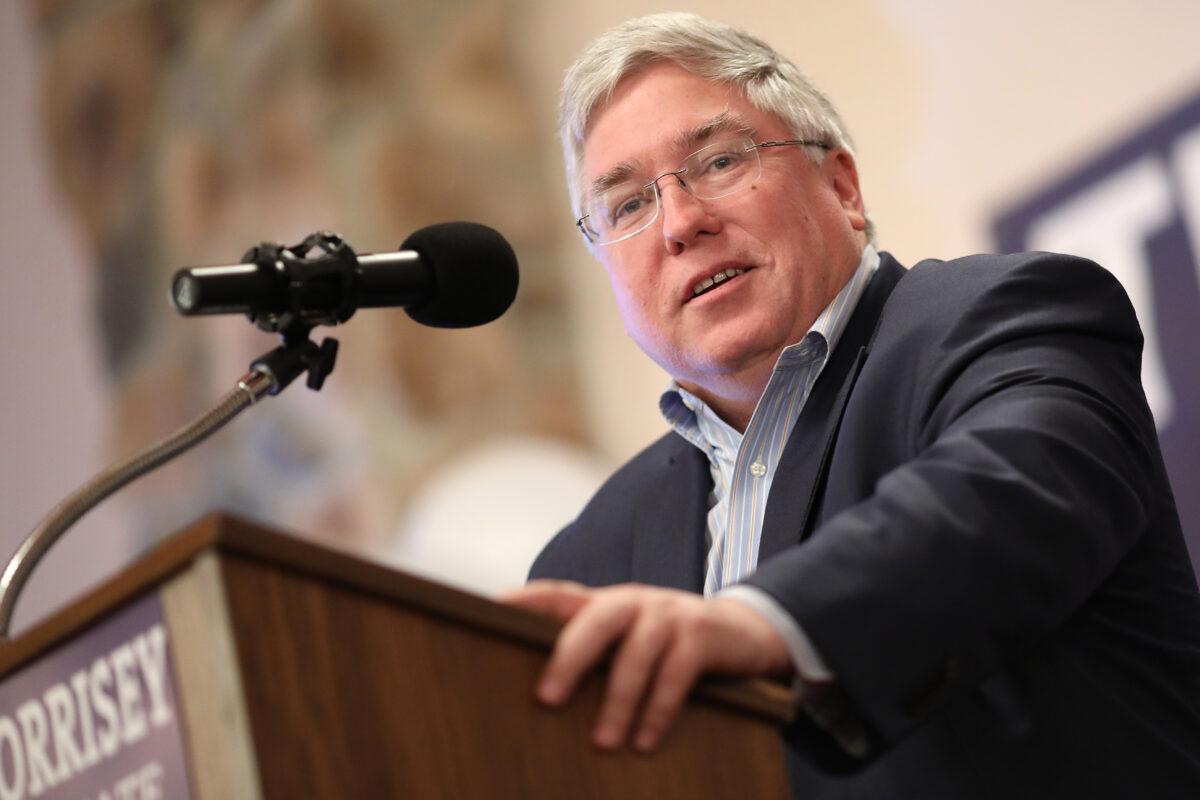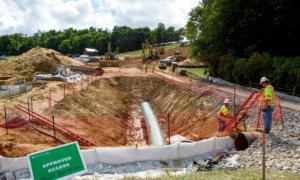After years of delay, Mountain View Pipeline set to funnel natural gas into Virginia, boosting energy security, stabalizing costs for mid-Atlantic utilities.
The 303-mile, $7.85 billion Mountain Valley Pipeline has received final federal approval and is set to begin piping 2 billion cubic feet of fracked shale natural gas a day from West Virginia into Virginia this summer.
The company “has adequately stabilized the areas disturbed by construction and that restoration and stabilization of the construction work area is proceeding satisfactorily,” Mr. Turpin said in the letter. “I approve Mountain Valley Pipeline, LLC’s request” to start operations.
Equitrans Midstream Corp. proposed construction of the Mountain View Pipeline (MVP) in 2015. FERC, a federal agency that regulates interstate transmission of electricity, natural gas, and oil—including the electric grid and pipelines of all types—approved MVP in 2017. It broke ground in 2018.
The proposed pipeline drew sustained protests by environmental groups—one climate activist spent 932 days straight in a tree—and a gamut of lawsuits challenging it across an array of regulatory and statutory issues, including the use of eminent domain, impacts to forests, waterways, and wildlife, and Virginia environmental justice laws.
Proponents argue the capacity of MVP’s 42-inch diameter pipeline to deliver 2 billion cubic feet per day of natural gas, about a third of West Virginia’s marketable production, can help ensure energy stability and lower electricity costs in mid-Atlantic states.
The 4th U.S. Circuit Court of Appeals twice issued rulings halting construction. As a result, the pipeline is more than six years behind the original schedule and at least $500 million over budget.
Sen. Joe Manchin (I-W.V.), the retiring Senate Energy and Natural Resources Committee chair who recently left the Democrat party and declared himself an independent, seemingly assured the project would be completed when he agreed in 2022 to support President Joe Biden’s green energy initiatives in exchange for approving the pipeline.
In April 2023—with 283 pipeline miles completed—the 4th circuit delayed the project a second time when it questioned if FERC had adequately assessed “unexpectedly severe erosion and sedimentation along the pipeline’s right-of-way.”
The halt drew a furious response from Mr. Manchin, Sen. Shelley Moore Capito (R-W.V.), U.S. Reps. Carol Miller (R-W.V.) and Alex Mooney (R-W.V.), and Republican Gov. Jim Justice, who is the favorite to succeed Mr. Machin in the Senate in November’s election.
As part of June 2023 Fiscal Responsibility Act (FRA) negotiations, Mr. Machin secured the administration’s agreement to not oppose the project.

Manchin, Morrisey Make Their Case
Shortly after, West Virginia Attorney General Patrick Morrisey, heavily favored to succeed Mr. Justice as the state’s governor this fall, submitted a 31-page brief to the U.S. Supreme Court, arguing Congress had already authorized the pipeline’s permit in the FRA.
Although the Biden administration no longer opposed the pipeline permit after the adoption of the FRA, Mr. Morrisey told The Epoch Times in November that the costly, time-consuming delays in the project are typical of a regulatory and legal environment stifling energy innovation and driving fuel costs up.
“This administration and a lot of the administration’s allies have pushed so far over in the wrong direction that our country’s hurting—it’s hurting from an economic perspective, it’s hurting in terms of a loss of American energy independence, it’s hurting the terms of initiatives and innovation,” he said.
In March 2024, the Senate Energy and Natural Resources Committee approved Mr. Manchin’s nomination of West Virginia Solicitor General Lindsay See, who had defended the state’s Department of Environmental Protection’s water permit for the pipeline before the 4th Circuit in 2023, to be a FERC commissioner.
Mr. Turpin, in his June 11 letter to Equitrans’ Deputy General Counsel Matthew Eggerding, said after a mid-May staff inspection, the project was in compliance with FERC environmental conditions and “proceeding satisfactorily.”
That inspection was prompted by a May 1 rupture at Bent Mountain in Roanoke County, Virginia, during hydrostatic testing that delayed construction of the final leg of the pipeline over numerous water crossings and rugged mountains in West Virginia and Virginia.
Equitrans said in January the pipeline was 94 percent finished. In May, the company announced the project was “mechanically complete” and scheduled to start operations. That plan was delayed by the rupture. FERC’s June 11 determination said inspections confirmed it can begin operating.
The pipeline will move methane gas from the Marcellus and Utica shalefields in Wetzel County, West Virginia, to Pittsylvania County, Virginia. It is a joint venture between Equitrans, NextEra Energy, Consolidated Edison, and AltaGas. RGC Resources built the pipeline.
The next phase is an extension into North Carolina, although those plans are in flux following postponements and revisions that have shortened and rerouted its originally planned 75-mile track.
Original News Source Link – Epoch Times
Running For Office? Conservative Campaign Consulting – Election Day Strategies!


